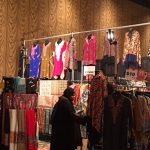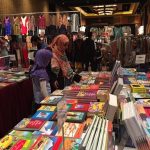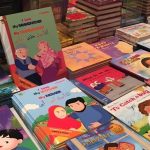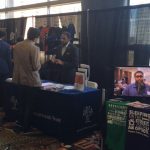HOUSTON, Texas – While listening to speakers at the recent Islamic Circle of North America’s South Central 2017 convention “Slaves of Allah, Servants of Humanity,” Suzanne Itani, a Muslim convert, pointed out three non-Muslim guests she invited to the conference, which was held in Houston Nov. 24-26.
“I brought my sister, my nephew and my friend,” Itani told AboutIslam. “I think it’s important that they come and see what it’s all about.”
Convention organizers likely had the same thought.
Though several prominent Muslim speakers graced the convention stage offering spiritual lectures and talking on topics relevant to followers of Islam, an entire portion of the event called “Meet Your Muslim Neighbor” was dedicated to dawah and interreligious outreach.
To enhance the event, several placards were erected explaining basic elements of Islam such as the five pillars, the six articles of faith, the meaning of Shari`ah Law and other fundamentals of the religion.
There were also several placards dedicated to prominent Muslim women, both past and present.
Among the women honored at the event was Ibtihaj Muhammad, an American Olympic bronze medalist and the first member of the United States Olympic team to compete while wearing a hijab, as well as Zaha Mohammad Hadid, a famed Iraqi-British architect who, prior to her death in 2016, was the first woman to receive the Pritzker Architecture Prize and winner of the Stirling Prize, the United Kingdom’s most notable architectural award.
Also featured were wives of the Prophet Muhammad, (pbuh), in addition to Maryam the mother of Jesus (pbuh) and Asiya, the wife of the Pharaoh.
Interfaith Outreach
The dawah event attracted several non-Muslims, including women from a local Bible study group.
One of Itani’s guests, long-time family friend Janice Roark, said although she’s a practicing Southern Baptist, she is open-minded when it comes to people of other faiths, cultures, and backgrounds.
“I’ve never been prejudiced in all my life,” Roark said.
“We need to love everyone, it doesn’t matter what religion you are, who you are or what color you are, whether you’re pink or purple or black. We’re all God’s creation, and we should treat each other equally and fairly. It’s not for me to say someone’s beliefs are wrong or for them to say that mine are wrong.”
Roark, who hails from Mississippi, said she was happy to be at the convention and was surprised to learn about the many similarities shared by Islam and Christianity.
“I’ve never sat down and heard a lot (about Islam) so that’s why I wasn’t opposed to coming today. I’m always willing to learn something new,” she said.
“A lot of what I’m hearing (about Islam) is basically what I believe and what I think about religion.”
Itani was happy to be able to share her faith with those of her circle who may not be fully aware of Islam’s tenets and characteristics, and though she said she was encouraged to see the interfaith efforts being made and a diversified set of speakers, she was disappointed in what she considered a lack of diversity even among the convention’s Muslim attendees.
“Where are our African-American brothers and sisters, or the white sisters, or even the Arabs?” she asked.
Itani also said ICNA’s efforts could also be bolstered by a focus on what she called “vulnerable communities.”
“(ICNA) should offer attendance scholarships to low-income mosques (whose congregants might be unable to afford convention registration costs),” she said. “By speaking to the people who are here you’re just preaching to the choir.”
In addition to hearing from noted speakers, convention attendees enjoyed a robust bazaar where everything from Islamic books to prayer rugs and clothing were available for purchase along with a wide selection of jewelry and other goods.
Convention-goers also had the opportunity to learn about various Islamic charitable organizations, as well as Islamic financing and investing. Friday prayers, along with a sermon, and separate events for men, women, and children were offered as well.






